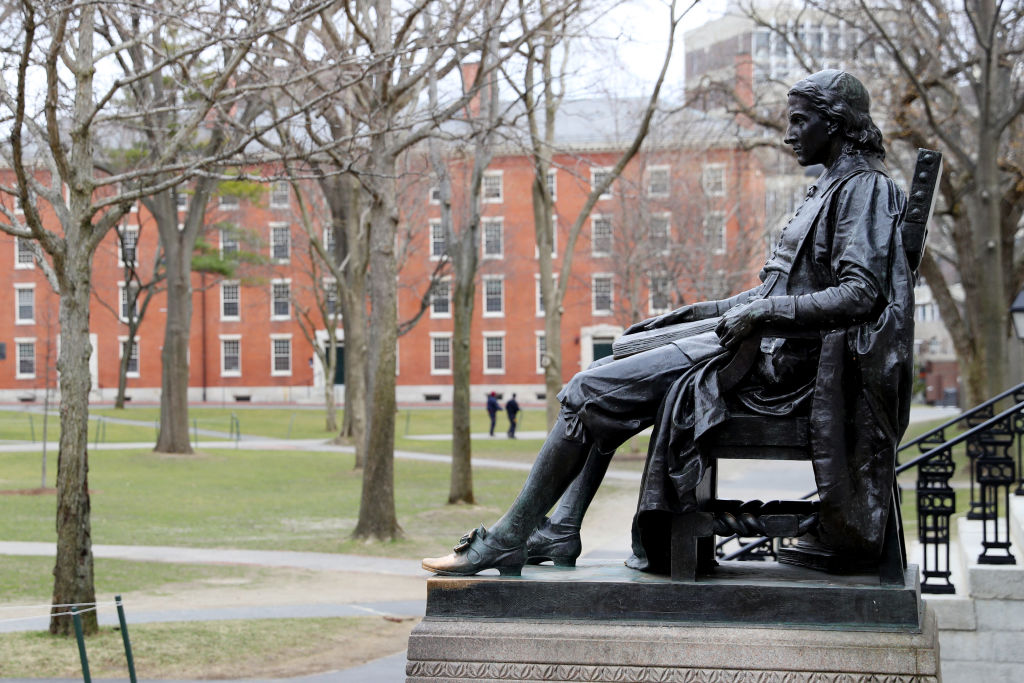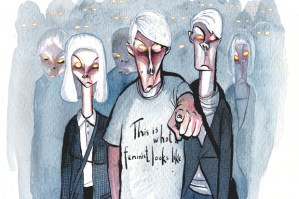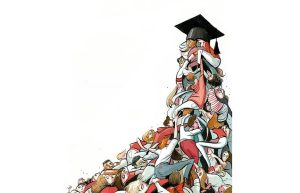Harvard and Yale are in hot water — well, at least lukewarm — for failing to disclose enormous gifts from foreign sources, as they are required to do by federal law. After falling fast asleep on the enforcement of that law for more than 30 years, the US Department of Education (ED) has suddenly decided that, yes, colleges and universities really should divulge when they have decided to accept significant funding from abroad.
Complaints about ‘dark money’ in American politics are a favorite theme for campus progressives. They don’t like the idea that wealthy Americans acting through nonprofit organizations have a relatively free hand to make gifts to the political parties and candidates of their choosing, and that the candidates often choose not to disclose who gave what. In the 2016 election cycle, dark money added up to $181 million, according to the Center for Responsive Politics. But the dark money in politics is a fraction of the dark money in higher education.
In a press release in February, ED announced its investigation of foreign-gifts reporting at Harvard and Yale — the latter of which may have failed to report ‘at least $375 million in foreign gifts and contracts’ over just the past four years. Multiply this by the decades of non-reporting that preceded it, and Harvard and Yale alone probably received unreported foreign gifts and contracts in the billions of dollars.
ED also said that its enforcement efforts since July 2019 have prompted the reporting of ‘approximately $6.5 billion in previously undisclosed foreign money’.
Why is this a problem? For one thing, there’s that federal law: gifts above $250,000 from foreign sources to American colleges and universities must be disclosed. Colleges and universities, like all institutions, make policy decisions based on available funding and prospects for future revenue. Foreign governments and private parties aligned with those governments can gain significant influence over American higher education by making what are — from their perspective at least — modest investments in programs, centers, laboratories, professors and sometimes students.
Better still, if American universities cooperate, these transactions can be kept invisible. The US government need not know — nor students, faculty, alumni and the general public.
Several years ago the National Association of Scholars (NAS), of which I serve as president, launched the project ‘Purchasing Influence’, aimed at documenting some of this dark money and tracing its influence. We chose three areas where it seemed apparent that undisclosed foreign money was having a significant impact: China’s Confucius Institutes; Saudi Arabia and Qatar’s funding of Middle East Studies centers; and the mysteriously funded anti-Israel Boycott, Divestment and Sanctions (BDS) movement.
We thought that the Confucius Institutes would be the simplest to research, so we started there. We were wrong. A few months into our study we realized that these institutes were part of a very large and complex effort by the Beijing government to gain sway over American higher education. More than a hundred had been established at US universities. Ostensibly benign programs to teach Americans Chinese language and culture, they served as cover for a variety of other efforts, including surveillance of Chinese students, undisclosed recruitment of American academics for Chinese programs, and espionage.
The Confucius Institutes are run by a Chinese government agency named Hanban, which also runs other efforts at foreign subversion. They were the most visible part of an effort to make American universities dependent on Chinese money and authority. Tuition dollars from Chinese students, opportunities to create and participate in programs at Chinese universities and emoluments flowing to US administrators and faculty members swirl around Confucius Institutes like the tentacles around a squid.
After we published our 2017 study, Outsourced to China: Confucius Institutes and Soft Power in American Higher Education, we suddenly had the interest of congressmen and senators, the State Department, the FBI and even agencies of other governments in countries that had been recipients of Chinese generosity in the form of Confucius Institutes. China responded in the ham-handed way totalitarian regimes often do. It called a press conference in Washington and lined up a collection of compromised American college and university presidents to testify that the institutes were nothing but a splendid instance of China’s benevolent intentions.
Largely due to NAS’s advocacy, US lawmakers have taken action against Confucius Institutes. Sens. Josh Hawley and Ted Cruz took the lead, and more than 30 have either closed or announced their closing since the release of our report. It’s an open question, though, how completely they’ve been closed. In some instances, they’ve simply been renamed. Once on the Chinese payroll, it isn’t that easy to get off. But it is clear that American colleges and universities are now alert to some of the liabilities of entering into secret agreements with the Chinese government.
Our study of Confucius Institutes, intended to be a simple warm-up to our studies of Middle East Studies centers and the BDS movement, thus took on a life of its own. In trying to figure out how much money was flowing to the universities through the institutes, we turned to the Department of Education, which we knew was supposed to track such information. We quickly found that it had done nothing of the kind. And that set us on the path to encourage the reinvigoration of enforcement of the law, ideally improving it by requiring disclosure of gifts smaller than the $250,000 threshold per year specified by Congress. We figured that this threshold could easily be gamed by parties making multiple gifts of smaller amounts, so we proposed a lower one of $50,000. After all, it doesn’t take a lot of money to buy the complicity of the average college administrator.
This is the story behind ED’s sudden awakening to the peril of undisclosed foreign gifts. But it is clearly only a small taste of the banquet of financial corruption that undisclosed foreign gifts have created in American higher education. NAS is just one small organization with a handful of researchers and no subpoena power. In this case, we opened a casement window and let the light in on an astonishing scene of malfeasance that includes many of the nation’s top universities.
Harvard and Yale, of course, will find ways to dodge the scandal. They are the very definition of well-connected, immune to adverse consequences from their own misdoings. But the game will now change, and it will become harder to sell out American higher education to foreign adversaries.
NAS applauds Secretary of Education Betsy DeVos’s steps to enforce existing law. We encourage her to strengthen regulations, and we encourage Congress to craft a new law that mandates greater transparency surrounding foreign support for American higher education. We put forward exactly that proposal in 2017 as the Freedom to Learn amendments, intended as a way to improve the Higher Education Act (HEA), which was then up for reauthorization — and still is.
Current foreign-gift disclosure regulations are found in Section 1011f of the HEA. As noted, it requires schools to report only gifts worth $250,000 or more per year — and does not mandate them to report any information on the donor besides country of origin.
The question of who funds American colleges and universities ought not to be hidden in darkness when substantial amounts of that funding come from the nation’s rivals and adversaries. At a minimum, Americans should demand transparency from these institutions that are so favored by our laws, and so generously funded by our people. We were not the first to notice ED’s failure to enforce the law. In 2008, Stanley Kurtz, who had been tracking Saudi funding in American higher education, wrote an article entitled ‘Following the Foreign Money’. Kurtz argued that while most gifts to American colleges and universities are likely ‘benignly intended and do substantial good’, we must not assume that all are so. Many foreign gifts are suspicious in nature, and all should be subject to rigorous transparency regulations to safeguard America’s national security.
Georgetown and Harvard, for example, each received gifts of $20 million from Saudi Arabia’s Prince Al-Waleed bin Talal in 2005. Why? No one knows for sure. Kurtz suggested such funding was linked to a widespread Saudi attempt to influence the country’s portrayal in American K-12 education after 9/11. Regardless of one’s personal views on these matters, Kurtz’s concerns were warranted.
Such foreign gifts go from suspicious to outright dangerous. Confucius Institutes don’t stop at whitewashing China’s history of suppressing democracy protesters, Falun Gong adherents, Uighurs and other national minorities; or covering up its brutal enforcement of its former one-child policy with forced abortions and sterilizations; or obscuring its adventures in the South China Sea and its policies toward Taiwan and Tibet. Rather, they are beachheads for a government intent on stealing American intellectual property and research. Every US college president who signs a Confucius Institute agreement is making himself party to such an assault on the national interest.
The rot goes deeper than venal administrators. Another of China’s attempts to purchase influence in American higher education goes by the name of the Thousand Talents Program (TTP). This pairs American researchers with Chinese counterparts in secret deals that can substantially enrich the American professors. It recently broke into the news with charges against Harvard’s chemistry chair Charles Lieber. Professor Lieber, a titan in his field, allegedly participated in the Thousand Talents Program and lied about his involvement.
Since 2008, Lieber had received more than $15 million in US taxpayer money through funding from the National Institutes of Health and the Department of Defense. But the Chinese supplemented this with a stipend of $50,000 per month, an expense account of $158,000 per year and a $1.5 million gift to build a lab at the Wuhan University of Technology. Lieber hid all of this, and we are left to presume that highly sensitive nanotechnology is now firmly in the hands of his Chinese paymasters.
Thousand Talents has more than 7,000 scientists and engineers under contract for ‘research collaboration’ (‘collaboration’ is the key word). And it is only one of more than 200 ‘talent-recruitment’ agencies run by the Chinese government.
Thousand Talent membership is kept secret as researchers funnel their work to Chinese ‘shadow labs’ in exchange for large sums of cash. In this case, the universities themselves don’t know which of their faculty have taken the dark money. It is clearly not intellectual collaboration, but a cover for theft of intellectual property.
True reform depends on consistent cooperation from colleges and universities, not just better legislation. But don’t expect it. A 2019 report by the Senate Permanent Subcommittee on Investigations shows that ‘Nearly 70 percent of US schools that received more than $250,000 from Hanban failed to properly report that information to the Department of Education’. As it now stands, ED relies on the honor code to receive foreign-gift reports. It’s not working.
The Department of Education still faces the daunting problem that existing foreign disclosure regulations are not strong enough and have never been actively enforced. After decades of neglect by the educrats in DC, Secretary DeVos is taking the problem seriously, but she has to challenge a culture of impunity by the schools and somnolence by ED careerists. ‘This is about transparency,’ DeVos says in the investigation press release:
‘If colleges and universities are accepting foreign money and gifts, their students, donors, and taxpayers deserve to know how much and from whom. Moreover, it’s what the law requires…we will continue to hold colleges and universities accountable and work with them to ensure their reporting is full, accurate, and transparent, as required by the law.’
This investigation is good news for all who value our national security. Colleges and universities are, after all, intended to serve a national purpose. But the nation in question is the United States, not Saudi Arabia or the People’s Republic of China. The failure to keep track of this flood of money has led to the moral and intellectual corruption of college officials and some faculty members. And it has diverted our academic institutions into a dangerous pursuit of favor from the nation’s adversaries.
Secretary DeVos and ED should press on in their vigorous enforcement of foreign gift disclosure and strengthen regulations for greater transparency. Congress should rise to the challenge by improving the underlying law. And the boards of trustees of US colleges and universities should insist on accountability from the presidents, provosts and deans who, in some cases, have been selling their institutions piecemeal to foreign buyers. How likely is it that Americans in general will look with admiration on institutions that exchange their legacy of free inquiry and scientific advancement for lavish gifts from antagonistic foreign powers?
This article is in The Spectator’s April 2020 US edition.


















